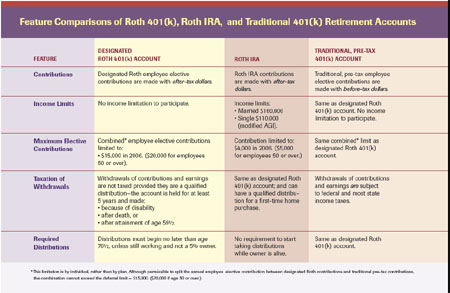When considering a Roth 401(k) vs a Traditional 401(k) you need to do one thing: Find out if your employer offers Roth 401(k) retirement accounts. If they don’t most of this information will be interesting but you can’t take advantage of any of it until your employer makes Roth 401(k)s available.
In should be noted that Roth 401(k)s are coupled with Traditional 401(k)s. The maximum contributions for both combined cannot exceed $15,500 for the year. If you are 50 + an additional $5,000 per year can be contributed to “catch up”.

This chart shows 2006 numbers. Add $500 to the limits for 2008 standards.
Roth 401(k)
Contributions:
- Contributions are made with after tax dollars
- Contributions and earnings grow tax free. Because the money was already taxed it won’t be taxed when you pull it out.
Employer Match:
Employers match are sent to Traditional 401(k). Roth 401Ks can’t accept employer match money.
Max Contributions:
$15,500 per year. For those that are 50 years old or more can add an additional $5000 yearly.
Distibutions:
Qualified distributions can be made after 5 taxable years from the opening the account. In addition, you must have either:
- turned 59 ½ in age
- died
- or became disabled
Nonqualified distributions are subject to income tax on earnings.
Hardship withdrawal guidelines are the same for Roth 401(k) as with Traditional 401(k).
Key advantages:
- No income restrictions. (Roth 401(k)s are available to everyone making a salary with no max limitations while Roth IRA’s aren’t available to those who make more than $110,000 as an individual.)
- Higher yearly contribution. $15,500 yearly maximum contributions instead of the Roth IRA minimum of $4,000
- Earnings grow tax free
Disadvantages:
- Not widely available among employers. Due to the extra cost in accounting and book keeping Roth 401(k)’s aren’t being adopted quickly.
Why a Roth 401(k) is the best choice (if available):
Politicians promise lower taxes each election year but somehow taxes have increased inevitably. As much as I’d love to have someone get rid of taxes I don’t think we’re going to reduce taxes anytime soon. Benjamin Franklin said it best “In this world nothing is certain but death and taxes.”
For this reason a Roth 401(k) is usually always the best choice when compared with a traditional 401(k).
The other side of the argument is if your income tax rate is high now but will be low when you retire a traditional 401(k) might be better.
If your income tax rate is low now and will be higher later the Roth 401(k) is better.
Traditional 401(k)
Contributions:
- are made with pretax dollars
- are tax deductible
- are taxed when distributed.
- No more than $15,500 plus $5000 if over 50 years old
Employer Match:
The maximum is 6% up to a $230,000 salary for a total of $13,800.
Distributions:
59 ½ is the earliest you can receive distributions.
Early withdrawals are subject to -10% penalty plus any taxes.
Minimum Required Distribution (MRD)
Begins the calender year when participant turns 70 ½ or the calendar year they retire. Required distributions may start even if the participant hasn’t retired. It begins April 1 of the year after reaching 70½.
Hardship Withdrawals:
Optional, varies among different plans
These conditions apply to spouse and minor dependents as well.
Some medical expenses
Some costs on the purchase of a primary residence
Tuition and educational expenses
Preventing foreclosure on primary residence
Funeral expenses
Hardship withdrawals are only available if there are no other means to pay these debts. In other words, this is a last resort.
401(k) Loans:
- 1-2% above prime
- Interest goes towards 401(K) account
- Usually only one loan per 12 month period
- Failure to repay loan could result in 10% penalty plus other taxes
- If you leave your job, 60 days is a standard repay time
- Most loans are 5 year loans
Additional Resources:
http://www.irs.gov/retirement/sponsor/article/0,,id=151926,00.html
http://www.irs.gov/pub/irs-pdf/p575.pdf
http://myretirement.retire.americanfunds.com/tools/calculators/roth-401k.htm
This is a summary and should only used for informational purposes only. Always consult a tax expert before making any decisions regarding your own financial plans.

